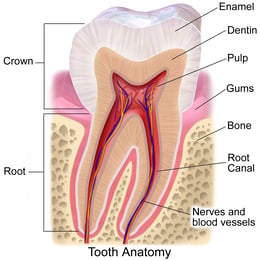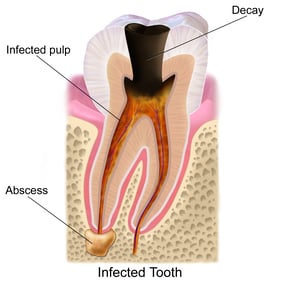
It’s unfortunately easy to overlook important tasks when we get busy and distracted. And “busy and distracted” describes many of our lives these days, so you can imagine how many important items are neglected every day.
In many cases, this trend translates to inconvenience and frustration. You may forget to make an important phone call or accidentally overdraft your checking account. While these occurrences are annoying, they’re usually not paired with severe consequences. But there are some important tasks that can lead to serious problems if they’re neglected for too long.
One example is ensuring adequate dental care for your family.
Related Content: The Importance of Family Dental Care
 Why dental care gets neglected
Why dental care gets neglected
While we prioritize things like fixing our cars or paying our bills because we recognize the serious (and expensive) consequences of failing to do so, dental care doesn’t always register with the same urgency.
No one wants to lose transportation to work or come home to find the power has been turned off. But, what’s the immediate consequence if you don’t visit the dentist this year? After all, if you’re not currently in pain, and there’s nothing obviously wrong inside your mouth, why would you even think of your teeth, gums, and jaw?
By failing to consider the serious potential consequences before they become apparent is how your family dental care could become neglected.
What are the consequences of neglecting dental care?
"While we prioritize things like fixing our cars or paying our bills because we recognize the serious (and expensive) consequences of failing to do so, dental care doesn’t always register with the same urgency."
Serious dental problems like tooth decay and periodontal disease can involve chronic pain and infection once they progress. But early on, they may have little or no symptoms at all. That doesn’t mean they’re not doing damage, though.
For example, the enamel coating on the surface of your teeth does an incredible job of protecting them from the constant wear and tear of biting and chewing as well as the barrage of acidic food and bacteria attacking the inside your mouth. When enamel finally weakens to the point that a cavity can form, it starts out nearly microscopic.
However, even that tiny breach in your tooth’s defenses can immediately start allowing bacteria and acids to enter the softer and more vulnerable dentin and, eventually, the pulp of the tooth. That’s when you may start feeling pain or sensitivity in the tooth. But by that time, the damage to the enamel has grown far worse than it was originally.
You can picture a cavity much like a funnel: As the depth of the cavity increases to reach far enough into the tooth to cause pain, the top of the cavity can increase in width. So, if you note pain in a tooth and choose then to go to the dentist and get it checked out, there’s an excellent chance the tooth will have already sustained damage and will require a repair.
On the other hand, if you visit the dentist routinely, as recommended, potential cavities can likely be caught early on before they cause damage or pain. For more tips, see our recent article on the importance of family dental care.
 How to best care for your family’s dental needs
How to best care for your family’s dental needs
This same principle applies to nearly all potential dental problems: prevention through good oral health habits and early detection through regular visits to the dentist will always result in better overall care than waiting until symptoms prompt you to make an appointment and get something fixed.
The best way to care for family dental needs is to make sure everyone in the family is following the recommended prescription for good oral health:
- Brush at least twice a day for at least two minutes each time
- Floss at least once each day
- Rinse 1-3 times per day with an antibacterial mouthwash
- Visit your dentist for a cleaning and routine examination every six months
If cost is an issue standing in the way of every family member seeing a dentist every six months, consider joining a dental discount plan to reduce the cost and ensure their oral health is being properly cared for.
By focusing on prevention through good oral hygiene habits and adequate routine dental care, you and your family can enjoy the benefits of strong, healthy teeth and gums for a lifetime. Apply these tips to properly address your family dental care needs.

